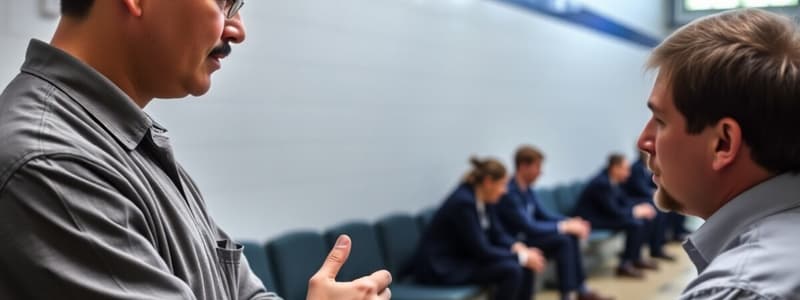Podcast
Questions and Answers
What was the primary focus of the Philadelphia Society for Alleviating the Miseries of Public Prisons when it was founded?
What was the primary focus of the Philadelphia Society for Alleviating the Miseries of Public Prisons when it was founded?
- To provide financial support for prisoners
- To enhance the spiritual welfare of prisoners (correct)
- To advocate for the abolition of prisons
- To improve prison architecture and conditions
Which of the following statements best reflects the modern role of prison chaplains?
Which of the following statements best reflects the modern role of prison chaplains?
- They are primarily focused on conducting religious services.
- They provide comprehensive support including spiritual guidance and emotional care. (correct)
- They act mainly as security personnel in correctional facilities.
- Their responsibilities are solely limited to counseling inmates.
In what way does 2 Corinthians 1:3-4 serve as guidance for prison chaplains?
In what way does 2 Corinthians 1:3-4 serve as guidance for prison chaplains?
- It emphasizes the need for chaplains to comfort others with the comfort they receive from God. (correct)
- It highlights the importance of self-sufficiency in ministry work.
- It discourages emotional involvement with inmates.
- It encourages chaplains to focus solely on their own comfort.
What was Elizbeth Fry's significant contribution to prison reform?
What was Elizbeth Fry's significant contribution to prison reform?
What does Chaplain Maria Rodriguez’s experience illustrate about the impact of spiritual presence on inmates?
What does Chaplain Maria Rodriguez’s experience illustrate about the impact of spiritual presence on inmates?
Which characteristic is exclusive to supermax facilities?
Which characteristic is exclusive to supermax facilities?
What is a common misconception about medium security facilities?
What is a common misconception about medium security facilities?
How does the environment in maximum security facilities typically influence chaplaincy work?
How does the environment in maximum security facilities typically influence chaplaincy work?
What role does deterrence play in the correctional system?
What role does deterrence play in the correctional system?
What critical aspect do chaplains need to understand regarding security levels?
What critical aspect do chaplains need to understand regarding security levels?
Which of the following best describes the primary focus of faith-based rehabilitation programs?
Which of the following best describes the primary focus of faith-based rehabilitation programs?
What is a key component of addressing the spiritual needs of incarcerated individuals?
What is a key component of addressing the spiritual needs of incarcerated individuals?
Which demographic factor is crucial when accommodating various religious practices in prison?
Which demographic factor is crucial when accommodating various religious practices in prison?
Which of the following correctly identifies a primary role of a prison chaplain?
Which of the following correctly identifies a primary role of a prison chaplain?
In the context of restorative justice, which role do chaplains typically fulfill?
In the context of restorative justice, which role do chaplains typically fulfill?
What historical figure is noted for significantly influencing the development of modern prison ministry?
What historical figure is noted for significantly influencing the development of modern prison ministry?
Which of the following best describes a challenge faced by prison chaplains?
Which of the following best describes a challenge faced by prison chaplains?
What is a significant risk associated with the role of prison ministry that necessitates self-care and burnout prevention?
What is a significant risk associated with the role of prison ministry that necessitates self-care and burnout prevention?
What aspect of prison ministry is emphasized as essential for the rehabilitation process?
What aspect of prison ministry is emphasized as essential for the rehabilitation process?
Why might visiting incarcerated individuals be considered an act of righteousness according to Christian teachings?
Why might visiting incarcerated individuals be considered an act of righteousness according to Christian teachings?
Flashcards
Prison Chaplaincy Role
Prison Chaplaincy Role
The duties and responsibilities of a chaplain in a correctional facility, including pastoral care, legal/ethical navigation, and contributing to rehabilitation.
Prison Ministry History
Prison Ministry History
The evolution of religious support for incarcerated people, stemming from religious texts like the Bible and figures like John Howard.
John Howard's Impact
John Howard's Impact
John Howard's work, though not a chaplain, focused on improving prison conditions and advocating for humane treatment, influencing modern prison ministry.
Prison Chaplain Challenges
Prison Chaplain Challenges
Signup and view all the flashcards
Prison Ministry Goals
Prison Ministry Goals
Signup and view all the flashcards
Elizabeth Fry's role
Elizabeth Fry's role
Signup and view all the flashcards
Prison chaplain responsibilities
Prison chaplain responsibilities
Signup and view all the flashcards
Chaplain role example
Chaplain role example
Signup and view all the flashcards
Prison Chaplaincy rewards
Prison Chaplaincy rewards
Signup and view all the flashcards
Prison Ministry
Prison Ministry
Signup and view all the flashcards
Faith-Based Rehabilitation
Faith-Based Rehabilitation
Signup and view all the flashcards
Restorative Justice
Restorative Justice
Signup and view all the flashcards
Self-Care
Self-Care
Signup and view all the flashcards
Special Populations
Special Populations
Signup and view all the flashcards
Minimum Security Prison
Minimum Security Prison
Signup and view all the flashcards
Medium Security Prison
Medium Security Prison
Signup and view all the flashcards
Maximum Security Prison
Maximum Security Prison
Signup and view all the flashcards
Supermax Facility
Supermax Facility
Signup and view all the flashcards
Correctional System Roles
Correctional System Roles
Signup and view all the flashcards
Study Notes
Prison Chaplaincy Course Outline
- Course Objectives: Students will understand the role and responsibilities of a prison chaplain, navigate legal and ethical challenges of prison ministry, develop pastoral care skills in a correctional setting, appreciate diverse faith backgrounds of incarcerated individuals, and contribute to rehabilitation and reintegration efforts.
Week 1: Introduction to Prison Chaplaincy
-
Historical Context of Prison Ministry: Prison ministry has roots in organized religion, particularly the Christian tradition. Early figures like John Howard and Elizabeth Fry worked to improve prison conditions.
-
The Modern Role of Chaplains: Chaplains play a multifaceted role in the lives of incarcerated individuals, including spiritual guidance, conducting religious services, crisis intervention, advocacy, program coordination, and reentry support.
-
Challenges and Rewards of Prison Chaplaincy: Challenges include security constraints, limited resources, emotional toll, diverse needs, and maintaining boundaries. Rewards include witnessing transformation, building community, interfaith dialogue, personal growth, and societal impact.
Week 2: The Prison Environment
-
Understanding the Correctional System: Types include jails (short-term), prisons (long-term), juvenile detention centers, and halfway houses. Security levels vary (minimum, medium, maximum, and supermax).
-
Prison Culture and Dynamics: Inmate hierarchy, gang affiliations, the prison code (unwritten rules), and psychological effects of incarceration are all important aspects to understand.
-
Safety and Security Protocols: Visitation procedures, emergency response protocols, and the chaplain's role in maintaining security in correctional environments are essential. These roles include adhering to security protocols, reporting security concerns, and maintaining professional boundaries.
Week 3: Legal and Ethical Considerations
- First Amendment Rights in Prisons: Examining inmates' rights within the context of confinement.
- Confidentiality and Mandatory Reporting: Understanding professional conduct and reporting requirements.
- Boundaries and Professional Conduct: Establishing and maintaining appropriate professional boundaries is paramount.
Week 4: Diverse Faith Traditions in Prison
- Religious Demographics: Understanding the diversity of faith backgrounds among incarcerated individuals.
- Interfaith Dialogue: Facilitating respect and understanding across different religious beliefs.
- Accommodating Various Religious Practices: Enabling support for the spiritual needs of individuals.
Week 5: Pastoral Care for Inmates
- Addressing Spiritual Needs: Techniques in addressing spiritual needs during confinement.
- Counseling Techniques: Approaches for counseling incarcerated individuals.
- Crisis Intervention and Suicide Prevention: Identifying and handling times of need.
Week 6: Rehabilitation and Reintegration
- Faith-Based Rehabilitation Programs: Implementing faith-based initiatives for rehabilitation.
- Preparing Inmates for Reentry: Supporting inmates' preparation for life after release.
- Collaboration with Social Services: Cooperation with other institutions to improve outcomes.
Week 7: Special Populations in Prisons
- Ministering to Juvenile Offenders: Specific considerations for this challenging population.
- Gender-Specific Considerations: Tailoring support to specific gender needs.
- Mental Health and Addiction Issues: Understanding and addressing mental health needs.
Week 8: Restorative Justice
- Restorative Justice Principles: Understanding and implementing restorative principles in prison settings.
- Victim-Offender Reconciliation Programs: Implementing programs toward reconciliation
- The Chaplain's Role: Facilitating healing processes for victims.
Week 9: Self-Care and Burnout Prevention
- Maintaining Spiritual and Emotional Health: Implementing effective self-care techniques
- Building Support Networks: Creating supportive networks for individuals.
- Stress Management Techniques: Providing techniques for effectively managing stress.
Week 10: Practical Skills and Field Experience
- Conducting Religious Services in Prison: Organizing and conducting services.
- Organizing Volunteer Programs: Engaging community and volunteers.
- Site Visits and Guest Speakers: Involving inmates in various discussions and events.
Week 11-12: Legal, Ethical Considerations, Pastoral Care
-
Legal and Ethical Concerns in Correctional Settings
-
Pastoral Care in Confinement: Specific challenges and considerations for pastoral care in prison settings.
Studying That Suits You
Use AI to generate personalized quizzes and flashcards to suit your learning preferences.




